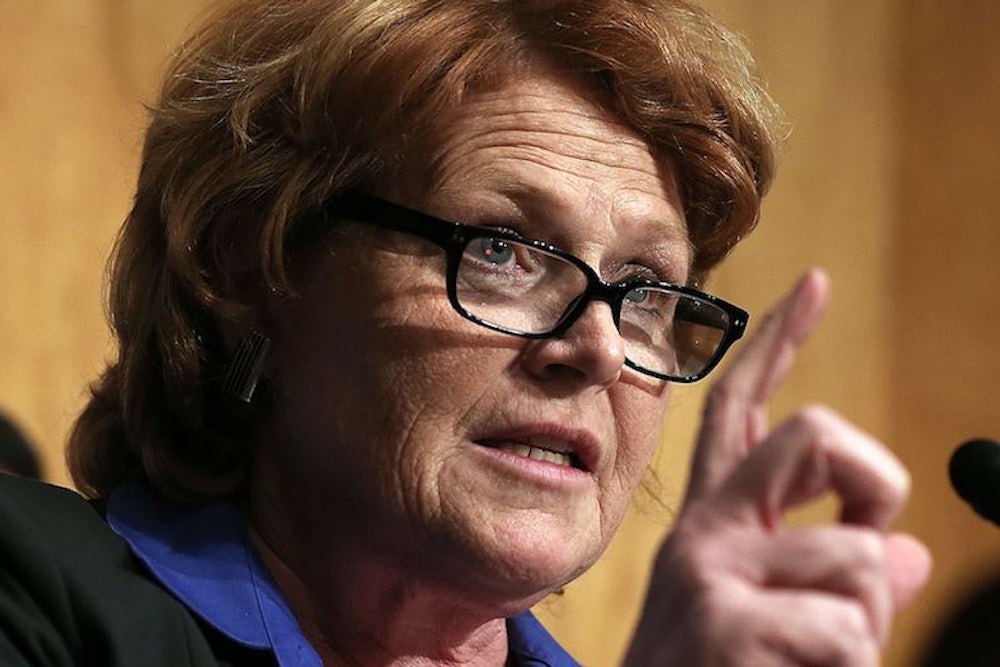When the Senate takes up the bill to expand background checks for gun purchases this week, we will hear plenty rationalizations for opposing it similar to the one offered recently by Heidi Heitkamp, the newly elected Democrat from North Dakota: “In our part of the country, [gun control] isn’t an issue. This is a way of life. This is how people feel, and it is extraordinarily difficult to explain that, especially to grieving parents.” Heitkamp’s bottom line: “I’m going to represent my state.”
That state has a population that did not crack 700,000 as of last year. In other words, that state is smaller than cities like Columbus, Fort Worth and Charlotte, and is only slightly larger than El Paso, Memphis and Nashville. North Dakota is separate from South Dakota only because Republicans who dominated the Constitutional Convention in 1889 thought it better to carve two Republican-leaning states out of Dakota Territory (railroad politics also played a role). And yet, North Dakota will have as much say this week as California, Texas, New York and Florida—how those 699,000 people “feel” in towns like Minot and Williston and Fargo will matter as much as how 38 million people “feel” in towns like Los Angeles and San Francisco and San Jose. Small, rural states will not only make it much harder to expand background checks to the huge gun shows where a big share of firearms are purchased, they may succeed in passing an amendment that would allow states with lax regulations for concealed-carry to trump stricter rules elsewhere—that is, to allow someone who got a concealed-carry permit in Wyoming (population 576,000, smaller than Portland, Oregon) to carry a concealed weapon in New York, where it’s much tougher to get a permit.
The undemocratic nature of the upper chamber of our legislative branch of government has been noted many times—it is, as the New York Times observed in an in-depth piece just a few months ago, “in contention for the least democratic legislative chamber” in the world, with the 38 million people who live in the 22 smallest states represented by 44 senators, while 38 million Californians are represented by two. But it is worth dwelling on this feature of our government again this week, because there are few issues where it makes itself felt as strongly as on guns. Max Baucus, the Montana Democrat, helped carry Obamacare to passage, but here he is on the background check bill: “I don’t support the bill, but I support open debate. Montanans are opposed to this bill—by a very large margin.” Montana’s population? Just over a million—a veritable giant by contrast with North Dakota, but also quite a bit smaller than Dallas, San Antonio and San Diego. And here’s Mark Begich shortly before he became one of two Democrats, along with Arkansas’ Mark Pryor, to decline to even allow the expanded background-check bill to come up for debate: In Alaska, he said, “We love our guns.” That’s nice! In Columbus, which has more people than Alaska’s 731,000, they love their Buckeyes, but that doesn’t mean they get to set national policy around them.
Bring this up, and the guardians of the wide-open spaces throw the Constitution in your face. But it’s worth recalling just how haphazardly this feature of our government came about, that it was not handed down from the mountaintop by James Madison. In fact, Madison, the father of the Constitution, vehemently opposed this design for the Senate when it was being debated at the Constitutional Convention. As a representative of one of the big states, Virginia, he was in favor of—gasp—apportioning votes in both legislative chambers by population. This fact is often lost on the small-state defenders, as I learned in the onslaught I received when I brought this matter up in 2009: They assume that because Madison supported one of the Senate’s initial undemocratic features—having its members selected indirectly, by state legislatures, in order to keep the Senate at a remove from the tempestuous masses—he must have supported undemocratic apportionment. He did not. He drafted the “Virginia Plan,” which called for two chambers, with members allotted by state population. Countering this was the “New Jersey Plan,” which called for only a single chamber with equal representation for each state (remember, this was pre-Short Hills Mall, and New Jersey was at the time a relatively small state.)
The solution, as any good civics student knows, was the Connecticut Compromise, which, as proposed by Connecticut’s delegates to the convention, created two chambers, the lower one apportioned by population, the upper one not. It was also hailed as the “Great Compromise,” which in hindsight makes it look like the first shining example of our political culture’s tendency to hail as achievements any deal that represents a middle point, no matter how shoddy its logic or deleterious its consequences. It’s also awfully ironic that it should be the Connecticut Compromise that may well keep the Senate from responding seriously to the worst act of mass violence ever perpetrated in Connecticut.
What to do? When, some time ago, I put this whole issue to Kent Conrad, the North Dakota Democrat whose retirement led to Heitkamp’s ascension, he was taken aback: “This was the grand bargain that was struck when the Founding Fathers determined the structure and form of the United States Congress… Are you proposing changing the Constitution?”
Maybe I am. At the time of the not-so-Great Compromise, the largest state, Virginia, was 11 times bigger than the smallest, Delaware. The ratio between California and Wyoming is now 66 to 1, yet they have the same sway in the Senate. Could the Founders have envisioned that? And are we OK with that? If so, just don’t be surprised if the gun bill is blocked or seriously weakened this week despite polls showing overwhelming support for expanded background checks. Undemocratic institutions produce undemocratic results. Mr. Madison could tell you that.
Follow me on Twitter @AlecMacGillis
